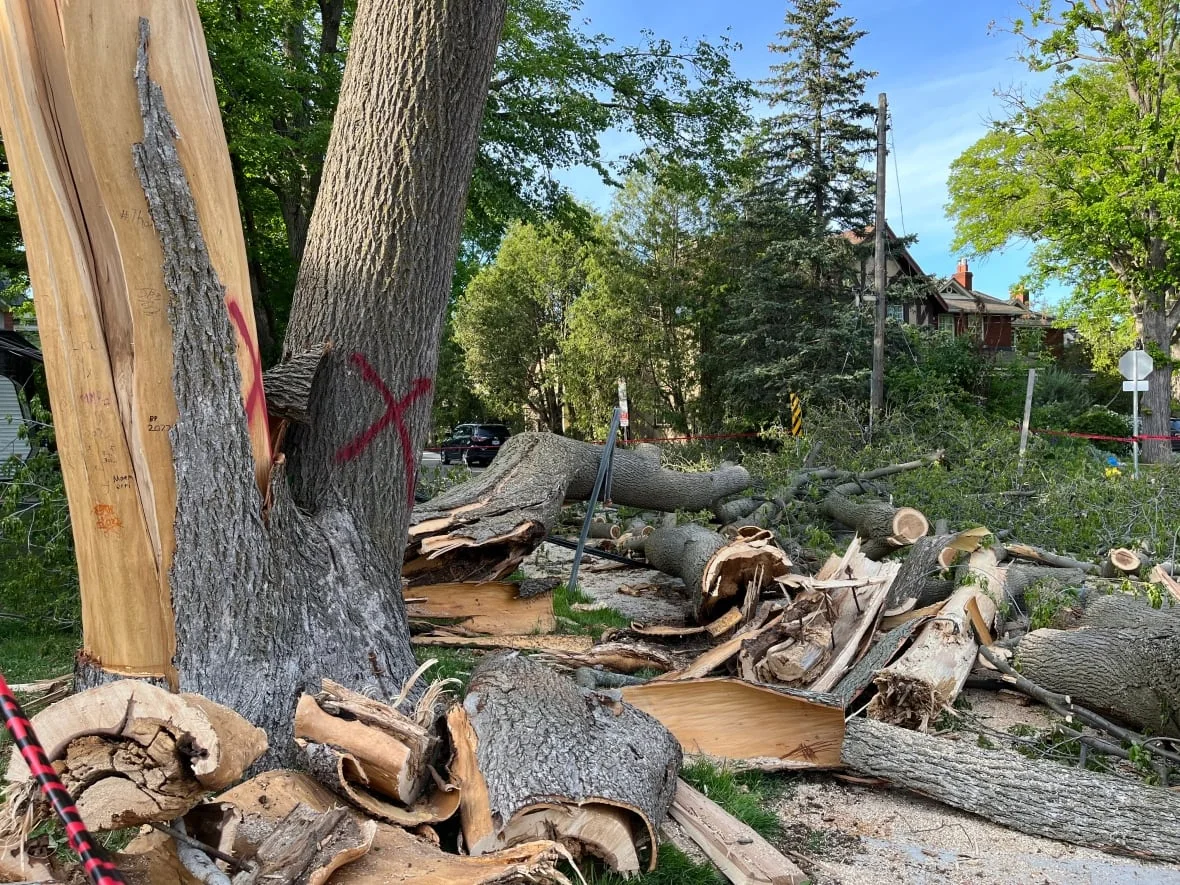
Spring bloom partly to blame for extensive storm damage, arborists say
The foliage and blooms that come with the Victoria Day long weekend are always a welcome harbinger of summer weather, but the fulsome greenery may have also contributed to the devastating damage suffered in eastern Ontario during the derecho storm.
DON’T MISS: All variables lined up to maximize loss and tragedy in Saturday’s derecho
Many trees were completely uprooted during Saturday's derecho storm in Ottawa, while others were toppled, and heavy branches broken throughout the region.
Alain Gonthier, general manager of the city's public works department, said there were two main factors for such widespread damage to the city's large trees.
"It's the extremely high winds that we've had and most of the impacted areas are basically more of mature communities, where we have larger tree canopy, larger trees," he said.
"When you have those high winds, that's a lot of pressure."

Many trees were severely damaged or destroyed by this weekend's storm. At least 10 people died in Saturday's storm, with most killed by fallen trees. (Hallie Cotnam/CBC)
Speaking at a news conference on Tuesday, Gonthier said areas with younger, shorter trees fared better overall against the winds that reached as high as 190 km/h in the city's south end.
Older mature trees had just grown leaves and they were damp due to the time of year, which meant they became top-heavy, he said.
"Had this storm hit a month or a month and a half ago when we had fewer leaves on the trees, the impacts may have been less," he said. "But a lot of trees were really starting to get their foliage. That creates a lot more pressure."
WATCH: THE 'FREAKY BALANCE' THAT LED TO SATURDAY'S DEADLY STORMS IN CANADA
CLEANUP WILL TAKE WEEKS
Ottawa Mayor Jim Watson said it'll likely take weeks to collect the wood and fallen debris now littering yards, urging people to remain patient. He suggested residents drag fallen material to the curb where crews can pick them up.
At least 10 people died in Saturday's storm, with most killed by fallen trees.
Fred Stevens of Manotick Tree Movers echoed previous statements from the mayor and from Hydro Ottawa, saying the derecho storm on Saturday was different from earlier powerful weather events like the 2018 tornado in Ottawa and the ice storm of 1998.
"We did an awful lot of pruning [but] the trees generally stayed intact," he said. "The worst ones were taken down but when you have something like this. It's [a] whole tree failure."
He said "the early leaf trees are the ones that really got hammered this time." Budding trees have fared better, he said.
TREES UPROOT EASIER WHEN GROUND IS SOFTER, ARBORIST SAYS
Ian Laidlaw, who works for Davey Tree Expert Company in Ottawa, says Saturday's weather set itself apart due to its impact throughout so many areas of the city.
"From one side of the city to the other. And just huge swaths of trees down everywhere," said Laidlaw, who added that trees will uproot easier when the ground is softer in the spring.
Laidlaw said the time of year had an effect on the amount of damage, but he believes many trees would have toppled regardless of the season.

Bundles of wood are piled by the street in Old Ottawa South. At a news conference on Tuesday, Mayor Jim Watson estimated it would take weeks to collect all the fallen debris. (Hallie Cotnam/CBC)
"The reason why trees get hit so hard in cities is they grow too wide," he said. "Like if you picture trees in the bush, they're just skinny little narrow things with some life at the top.
"In the city without proper maintenance, they just grow wild and out of control," said Laidlaw.
He recommends proper maintenance and pruning to minimize risk, but acknowledges when winds reach certain speeds, only so much can be done.
Laidlaw advises homeowners to not completely remove trees in fear of more major wind storms, but to seek expert advice before removing trees because they add value to properties.
Owen Clarkin, vice president of the Ottawa Field Naturalists' Club, agrees with Laidlaw that the wind speeds would have knocked over a tree of any weight, no matter the time of year.
"Trees can come down," he said. "That's just the nature of trees, right? They're big and they're heavy."
This article, written by Joseph Tunney, was originally published by CBC News on May 25, 2022.